For as long as I can remember, there has been something about Mother Nature that called me. Whether it was hiking, kayaking, hunting , or fishing; I was always infatuated with the outdoors. As I got older, I slowly but surely became partial to bass fishing. I fished my first bass tournament at the age of 13, where I caught our boat’s first keeper of the day; from then on I was hooked.
I grew up along the Illinois River, right in the heart of central Illinois. I was lucky enough to have been a sophomore in high school when the Illinois High School Association decided they were going to make bass fishing a high school sport. I had always been an athlete, but bass fishing as a school sport?! What could possibly be better than that! After getting a petition with over 90 signatures from my classmates, Pekin Community High School had a fishing team and would be competing in the inaugural Sectional Qualifying Tournament! That tournament was the first of many for my team and I, including 3 State Championship appearances. I was blessed with an awesome high school career and I could go on and on about high school fishing and the opportunities it has given the youth, but I’ll save that story for another day.
Currently, I am a junior at the University of Illinois and the President of the Illini Bass Fishing Club. College fishing has opened up a myriad of doors for me while introducing a whole new set of challenges. One thing that needs to be understood right off the bat is that college fishing is growing, exponentially. Even in my short two years, I have seen huge bounds forward in college fishing. Fantastic organizations such as B.A.S.S. and FLW put on professional level events, where college anglers can win prizes, money, boats, or even get on TV – all with no entry fee required.
It doesn’t stop there, the University of Illinois fishing team (as well as most college fishing clubs) is fortunate enough to have some of the best sponsors in the fishing industry supporting them; including Columbia Sportswear, Lew’s Reels, Dobyns Rods, and Tackle Warehouse, just to name a few. Not only are we able to use the best gear at a discounted price, but we also get a hands-on communications lesson through working with different companies and their representatives in a professional scenario. These are skills we can take on any path we choose to follow, fishing related or not, which says a lot about college fishing.
With the increase in industry support, it’s no surprise that the level of competition in college fishing has increased as well. Gone are the days of only a few dominant anglers in each field, now everyone can catch them. Collegiate anglers now have all the fancy toys and gadgets that the professionals do, and what they lack in experience, they make up for in their research. Online resources have opened the door for the younger, more tech savvy generation when it comes to pre-tournament research. Now, brand new resources like Fishidy have kicked that door even farther open, forcing even seasoned professionals to put more time into their preparations so they don’t ‘miss the boat’ on anything.
A recent B.A.S.S. article from Pete Robbins summed it up perfectly in my opinion; the up-and-comers in fishing are changing the game in a big way. They all have the right gear, the right attitude, and have put in their practice, both on and off the water, for each event. This poses the biggest question for me, and every other collegiate angler who fish these events: how do we catch fish at the rate of a seasoned, tour level pro who spends thousands of hours on the water every year while we spend our time sitting in class during the day, and keeping our grades up at night? And if that didn’t make it tough enough, collegiate anglers do this on a small budget; deciding which is more important, this week’s groceries or this weekend’s lures? Now, I don’t want to sound like I am complaining, because this is our decision and our obsession; we wouldn’t have it any other way! It simply gives us a whole new set of challenges that are unique to this growing group of college bass fishing students.
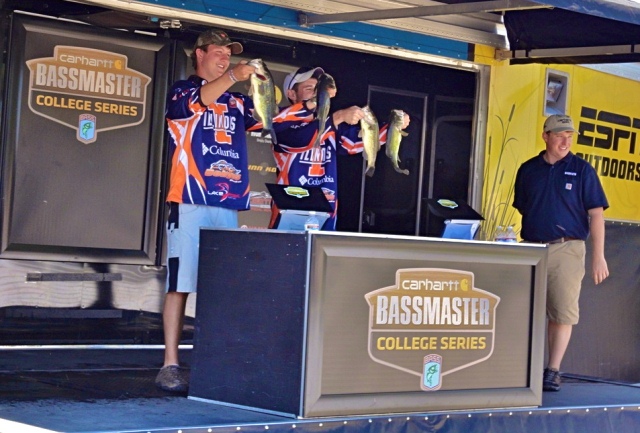 It definitely appears as though my fellow collegiate anglers and I are facing an uphill battle, which is true – for now. But if you take a step back and look at the big picture, all of these challenges are creating invaluable skills for the next generation of professional anglers. While we may not have enough time to run out to the lake in between classes, we can sure log on to Fishidy and identify some potential hot spots for next week’s tournament. We may not have enough money to get the latest and greatest gear, but we know how to take care of what we have and how to make sure our dollar goes farthest when it comes time for new tackle. Most importantly, when it finally comes time to leave campus for the real world, we won’t just have four years of college fishing experience, we will have a college degree! Suddenly, these “disadvantages” are starting to look like advantages that will help the next generation of young anglers give the veterans a run for their money. We are already seeing this in Matt and Jordan Lee, both of Auburn University, who have earned spots in the Bassmaster Classic through the College B.A.S.S. series and have been the ‘poster children’ for the new age of college fishing. These young men have handled themselves with class and stood (or will stand) toe to toe with the world’s best bass fisherman in the Bassmaster Classic. The idea that these two made it all the way to the biggest stage in competitive fishing without ever paying an entry fee is absolutely astounding and shows how organizations like B.A.S.S. feel about college fishing. There is no doubt in my mind that competitive fishing is headed in the right direction. College anglers are treated like professionals at every event we attend and we are expected to carry ourselves in that manner as well. After all, our generation is the key to the livelihood and the longevity of bass fishing in the years to come.
It definitely appears as though my fellow collegiate anglers and I are facing an uphill battle, which is true – for now. But if you take a step back and look at the big picture, all of these challenges are creating invaluable skills for the next generation of professional anglers. While we may not have enough time to run out to the lake in between classes, we can sure log on to Fishidy and identify some potential hot spots for next week’s tournament. We may not have enough money to get the latest and greatest gear, but we know how to take care of what we have and how to make sure our dollar goes farthest when it comes time for new tackle. Most importantly, when it finally comes time to leave campus for the real world, we won’t just have four years of college fishing experience, we will have a college degree! Suddenly, these “disadvantages” are starting to look like advantages that will help the next generation of young anglers give the veterans a run for their money. We are already seeing this in Matt and Jordan Lee, both of Auburn University, who have earned spots in the Bassmaster Classic through the College B.A.S.S. series and have been the ‘poster children’ for the new age of college fishing. These young men have handled themselves with class and stood (or will stand) toe to toe with the world’s best bass fisherman in the Bassmaster Classic. The idea that these two made it all the way to the biggest stage in competitive fishing without ever paying an entry fee is absolutely astounding and shows how organizations like B.A.S.S. feel about college fishing. There is no doubt in my mind that competitive fishing is headed in the right direction. College anglers are treated like professionals at every event we attend and we are expected to carry ourselves in that manner as well. After all, our generation is the key to the livelihood and the longevity of bass fishing in the years to come.
I hope my monthly ramblings about all things bass fishing will appeal to you in some way, shape, or form. I hope to discuss everything from tournament recaps to new techniques, triumphs to failures, and even a few ideas for chasing bass on a budget. (I hope you don’t like air conditioning or heat!) If you have any specific questions related to high school or college fishing, don’t hesitate to comment below or send me an email and I’ll do my best to answer it. Until next time, keep your baits wet and your lines tight!

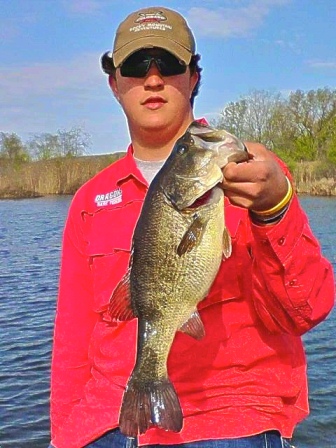
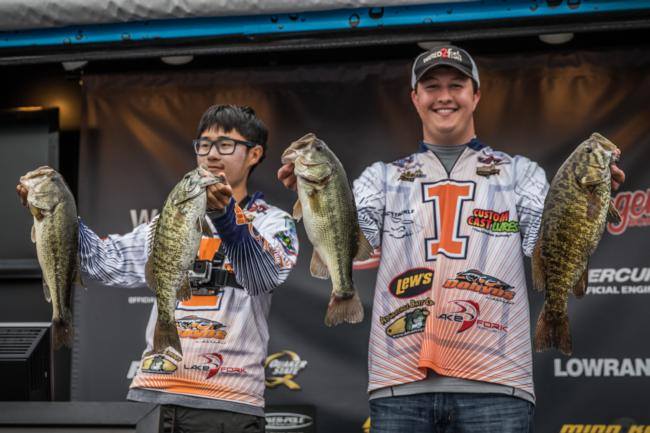
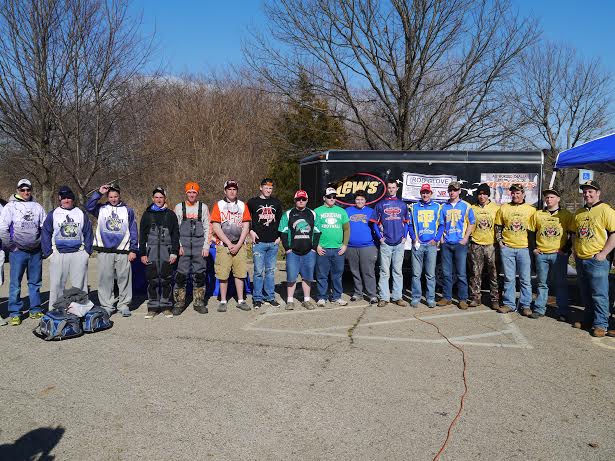
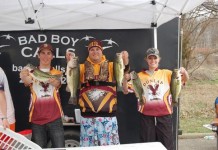
Well spoken! I graduated in 1991 from ISU and fished Evergreen and Bloomington Lakes every chance I got. I wish there were teams back then. I will pass this along to the students on my team at our next meeting. We have over 40 students on the team right now and its a bit overwhelming considering I had 7 last year. Looks like we will have JV and Varsity teams. Good Luck! Greg Ries
Thanks a lot Greg! And yes, we are very lucky to have collegiate fishing offered to us nowadays. That is awesome that you guys had such a jump in participation between last year and this year, thats what we like to see! Good luck with the team and please let me know if there is anything I can ever do to help.
Our team actually runs an open high school tournament every year in early April on Clinton Lake. Last year we had 68 boats and it really is a terrific event, you should think about getting some of your team members involved!
Well done Luke–I am proud of you for utilizing your ag/env communications skills to write this blog in a field you are very passionate about. I am glad you are taking my ag communications class this semester so you can apply what you learn to this type of activity, too! Keep communicating so the youth of today know about the BASS of tomorrow!
Hi Luke, great article! Heather and Greg, great job with your students as well. I would not be at all surprised if you would eventually become a teacher Luke. Really enjoyed your well written article, and reading about the teams in HS and college. That is just so cool.
Very well spoken!